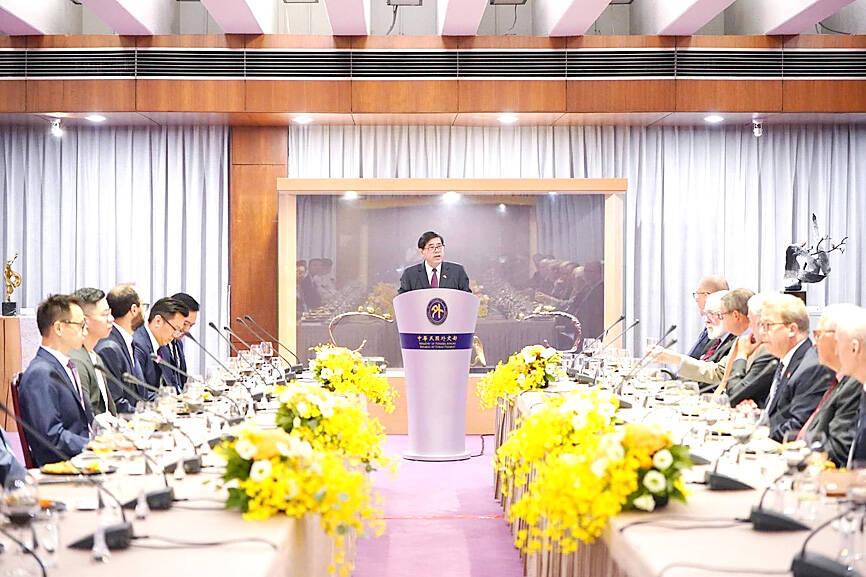Delegations from Canada and Germany yesterday visited government officials in Taipei, weeks after warships from both nations sailed through the Taiwan Strait.
Vice Minister of Foreign Affairs Remus Chen (陳立國) headed a luncheon to welcome the Canadian delegation, including Richard Fadden, former national security adviser to the prime minister; Martin Green, former Privy Council Office assistant secretary to the Cabinet; and Guy Thibault, former vice chief of the defense staff.
Both sides traded opinions on Taiwan’s national defense reforms, countermeasures against foreign information manipulation, bolstering mutual relations and increasing Taiwan’s participation in international bodies.

Photo courtesy of the Ministry of Foreign Affairs
Canada and Taiwan are both medium-sized nations and have interests in the Indo-Pacfic region, Fadden said, adding that Canada was looking forward to working with Taiwan in mutually beneficial areas and further deepening bilateral relations.
Chen extended Taiwan’s welcome to Canada’s first delegation on the issue of national defense and said that Taiwan was glad to see Canadian ships transiting the Taiwan Strait on July 31.
The move marked the fourth time that Canada has sailed warships through the Taiwan Strait since the announcement of Canada’s Indo-Pacific strategy in 2022, Chen said.
That highlights Canada’s resolve to uphold the liberty, openness and inclusivity of the Indo-Pacific region, he said.
Taiwan is also looking forward to working with Canada in areas such as countering disinformation, trade, medicine and technology, he added.
Meanwhile, Michael Muller, a member of the German parliament’s Committee on Foreign Affairs and a member of the Social Democratic Party (SPD), visited Taiwan with fellow SPD and Bundestag member Andreas Larem, meeting with Minister of Foreign Affairs Lin Chia-lung (林佳龍) and lunching with Deputy Minister of Foreign Affairs Francois Wu (吳志中).
Muller and Larem emphasized the importance for democracies worldwide to band together against the expansion of authoritarianism, adding that democratic nations should step up collaborations on economy, technology and cultural affairs.
Both expressed the hope that Taiwan-Germany relations would continue to deepen.
Wu said he had discussed issues of democratic collaboration, Germany’s strategies on China and the Indo-Pacific region, Germany’s navy ships passing through the Taiwan Strait and the EU’s de-risking policies with Muller and Larem over lunch.
China’s expansion is not solely a cross-strait issue, but a challenge to the world order, Wu said, adding that Taiwan sincerely hopes to work with like-minded partners in Europe to foster peace and stability in the Indo-Pacific region.
Lin said that democratic nations should band together to foster economic and cultural resilience.
He added that Taiwan is willing to share with its EU partners its experience in handling Chinese hybrid and information warfare, as well as measures dealing with China’s weaponization of its economy.

CHAOS: Iranians took to the streets playing celebratory music after reports of Khamenei’s death on Saturday, while mourners also gathered in Tehran yesterday Iranian Supreme Leader Ayatollah Ali Khamenei was killed in a major attack on Iran launched by Israel and the US, throwing the future of the Islamic republic into doubt and raising the risk of regional instability. Iranian state television and the state-run IRNA news agency announced the 86-year-old’s death early yesterday. US President Donald Trump said it gave Iranians their “greatest chance” to “take back” their country. The announcements came after a joint US and Israeli aerial bombardment that targeted Iranian military and governmental sites. Trump said the “heavy and pinpoint bombing” would continue through the week or as long

TRUST: The KMT said it respected the US’ timing and considerations, and hoped it would continue to honor its commitments to helping Taiwan bolster its defenses and deterrence US President Donald Trump is delaying a multibillion-dollar arms sale to Taiwan to ensure his visit to Beijing is successful, a New York Times report said. The weapons sales package has stalled in the US Department of State, the report said, citing US officials it did not identify. The White House has told agencies not to push forward ahead of Trump’s meeting with Chinese President Xi Jinping (習近平), it said. The two last month held a phone call to discuss trade and geopolitical flashpoints ahead of the summit. Xi raised the Taiwan issue and urged the US to handle arms sales to

BIG SPENDERS: Foreign investors bought the most Taiwan equities since 2005, signaling confidence that an AI boom would continue to benefit chipmakers Taiwan Semiconductor Manufacturing Co’s (TSMC, 台積電) market capitalization swelled to US$2 trillion for the first time following a 4.25 percent rally in its American depositary receipts (ADR) overnight, putting the world’s biggest contract chipmaker sixth on the list of the world’s biggest companies by market capitalization, just behind Amazon.com Inc. The site CompaniesMarketcap.com ranked TSMC ahead of Saudi Aramco and Meta Platforms Inc. The Taiwanese company’s ADRs on Tuesday surged to US$385.75 on the New York Stock Exchange, as strong demand for artificial intelligence (AI) applications led to chip supply constraints and boost revenue growth to record-breaking levels. Each TSMC ADR represents

State-run CPC Corp, Taiwan (CPC, 台灣中油) yesterday said that it had confirmed on Saturday night with its liquefied natural gas (LNG) and crude oil suppliers that shipments are proceeding as scheduled and that domestic supplies remain unaffected. The CPC yesterday announced the gasoline and diesel prices will rise by NT$0.2 and NT$0.4 per liter, respectively, starting Monday, citing Middle East tensions and blizzards in the eastern United States. CPC also iterated it has been reducing the proportion of crude oil imports from the Middle East and diversifying its supply sources in the past few years in response to geopolitical risks, expanding